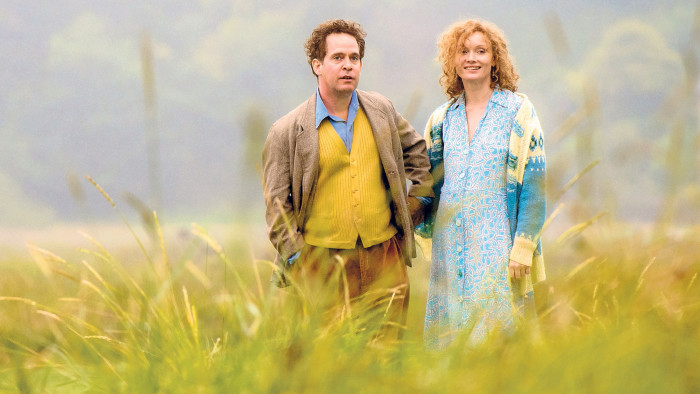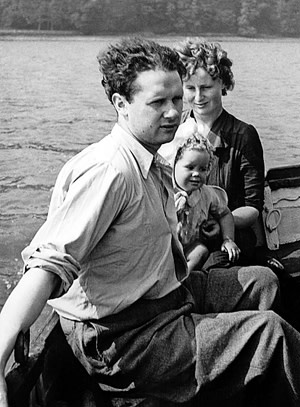Tom Hollander as Dylan Thomas in TV film ‘A Poet in New York’

Simply sign up to the Life & Arts myFT Digest -- delivered directly to your inbox.
We see so many performances based on real people. Meryl Streep as Margaret Thatcher, Michelle Williams as Monroe, Dominic West as Richard Burton – all actors faced with the gnarled question of whether to impersonate or interpret. In a new BBC TV film about Dylan Thomas’s booze-dripping, fatal visit to New York in 1953 – where the poet died at the age of only 39 – Tom Hollander gives a performance finely balanced between the two approaches: terrific mimicry, but unpredictable and subtle.
When I meet Hollander, 46, for a drink in a London club, he tells me that he started by finding the voice. “It suited me. It was within my grasp.” Thomas didn’t sound very Welsh, although he certainly sounded arch and grand. Hollander instinctively brought that down “otherwise I would get overwhelmed. It’s better to try and get near enough to him but also near enough me.” Yet in the moments when the poet takes to the New York stage to read his work – something that Thomas famously excelled at, and many recordings exist – Hollander daringly embraces Thomas’s incantatory, heavy-waters-rising tone also reminiscent of WB Yeats, who near-sang his lines.
Clouting the lectern mid-flow, Hollander’s well-padded bones seem to shake. “Grave men, near death, who see with blinding sight …” It’s touching. Up there, whisky-bloated, robed in a throttling 1950s bow tie.
“I’ve played a few of those characters. I played [the British double agent] Guy Burgess once, who was similar. Brilliant and then just faded out. Drank himself away. I guess people flower at different times. I was a relatively precocious youth so I find it easy to identify. I found adult life challenging. Childhood was idyllic.”
Hollander sang in Oliver at his first school in Oxford, sawed on the violin during term, revelled in youth theatre in the holidays. His Cyrano on stage at university in Cambridge, where he studied English, “wouldn’t leave much imprint on the world” and he didn’t get into drama school. So when did he know he really could act?
“When I was told I could. I’m a great believer in empirical evidence.”

When Hollander was 28, in the summer of 1995, the evidence was unequivocal. Jez Butterworth’s gangster comedy Mojo, set in 1950s Soho, has already been revived twice, so it’s difficult to remember the impact of that first, high-fun production. Hollander’s character, Baby, was the role everybody had wanted to nail, as a British answer to Tarantino’s 1992 Reservoir Dogs. An eccentric, toxically unreadable young villain with foul-witty lines. Hollander found the light switch. The drawling, sexually unspecific, petrifying moral blankness.
“Stage is an aerobic spike,” he insists. “And you are aware of having special powers in those moments. The space and the silence. Time is compressed but you’re living every little corner of it. And the energy you take off the street beforehand is your energy.”
When Butterworth, as director, cast somebody else as Baby in the movie of the play, Hollander admits it felt like a donkey kick. “Everything that I thought to be true turned out to not be true. I am this part. He is me. There is no discontinuity between me and Baby. The heady youthful feeling of indomitability ended at that moment. So, it was the highest point but also the lowest. Sometimes your dreams don’t come true.”
He says this without self-pity, and stresses later in an email that “it was a good lesson in training yourself to not quite believe the hype”. Hollander shares some of the quality of actors such as William Holden or John Cazale – possessing a melancholy pragmatism, at the same time giving the impression of being capable of single-handedly raising the temperature of the room. When I say that sadness, when it descends, kind of suits him, he spreads his hands with resignation at the condition of mortality that bedevils us all, and grins.
“You wouldn’t say that if you saw me as Macheath in The Threepenny Opera. Egotistical, wilful, psychopathic show-off!”
Acting careers are random. A part comes out of the blue and they’re not really “choices” as such – although Hollander’s recent triumph starring in the BBC television comedy series Rev, which he also co-wrote, was very much his choice, and has opened all sorts of doors.
But, in truth, it’s big-screen success he craves – as he should. He retains too much variousness and untypecastability to be purely a character actor. In his 50-plus screen appearances – from comedies such as Armando Ianucci’s In the Loop to classics such as Joe Wright’s Pride and Prejudice, and most recently an excellent Wilkie Collins to Ralph Fiennes’s Dickens in The Invisible Woman – whenever he turns up in parts large or small you find yourself thinking, “Ah, now something interesting is going to happen.”
In Robert Altman’s Gosford Park he quietly spoons strawberry jam in a parlour, giving a kitchen maid the jitters and the movie its most humane moment. Even when handed an unplayable part such as the Irvine Welshian film director in Ben Elton’s inept Maybe Baby, Hollander dinks it back over the net with an inappropriate wrongfooting intensity: it’s bizarre to find in a flaccid noughties romcom 10 minutes of the crackle reminiscent of Malcolm McDowell in If … another actor he calls to mind.
But what next? Whether or not his post-Rev popularity will prove a springboard or a prison one cannot tell. He could be “cuddly” on Sunday nights on ITV or a twice-a-year villain in Hollywood. It is unusual and exciting to see someone well into the second act of his career so undefined. Which Shakespeare part, I wonder, appeals to him most at this point?
“I could play the Fool [in King Lear] now. Bottom [in Midsummer Night’s Dream], I’d like to do Bottom. Not Hamlet. But then I never wanted to play Hamlet. But I love that line in Hamlet, ‘Actors are the abstract, and brief chronicles of the time.’ It’s a brilliant line isn’t it? Sometimes you last and sometimes you don’t – but you have to be there. You have to catch everything that’s going on.”
‘A Poet in New York’, BBC2, May 18
Comments